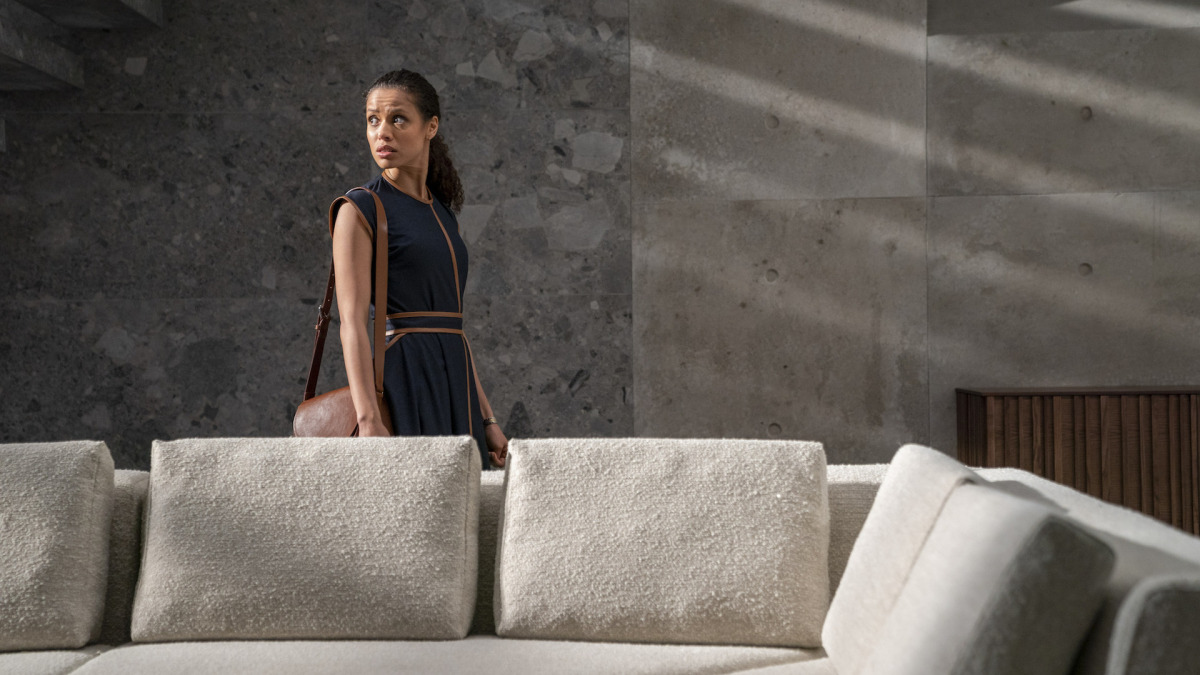Entertainment
HBO Max’s ‘The Girl Before’ makes a monster of minimalism

Content warning: This review contains discussion of sexual violence.
Minimalism both hides and exposes everything we accumulate. It appears to offer a literal clean slate, one with nowhere to hide. Easy to ridicule and covet in modern design, it’s become synonymous with deep thought, compartmentalisation, wealth, and uncompromised order. But as The Girl Before examines, people can’t simply sweep trauma under the rug, even if they feel pressured to.
Directed by Lisa Brühlmann and adapted by J.P. Delaney from his novel of the same name, the four-episode BBC series (now streaming on HBO Max) revolves around a modern, minimalist, concrete home crafted by architect Edward Monkford (David Oyelowo), who will only rent it to “people who live here the way he intended.” They must first pass his strict questionnaire. No personal belongings or embellishments are allowed, no ornaments, no rugs, no books, no children, no mess. It’s within these walls the series weaves its core mystery, focused on two women seeing the house as a clean slate from their own individual trauma and grief. These new tenants on different times are Jane Cavendish (Gugu Mbatha-Raw) and Emma Matthews (Jessica Plummer).

Jessica Plummer as Emma.
Credit: BBC
Adding a level of tension and all-too-familiar control, the house is equipped with a smart home system that tracks occupants’ movements. “It’s the price the tenant pays for living there,” Edward tells Jane. “Data instead of market rent.” In the style of tech thriller that inevitably screams Black Mirror, the smart house becomes a character of its own, mirroring Edward’s own controlling approach to relationships.
Run by an AI system called Housekeeper, the house leaves little room for personal preferences. It chooses your playlists, decides how long your electric toothbrush can be used, and turns lights off when it’s time for bed — whether you’re ready or not. According to an architect who takes a tour through the house, “It’s strongly influenced by the Japanese concept of ‘wabi,’ an austere disciplined serenity, effortless perfection.” But rather than leaning into an examination of tech and design’s impact on our lives, the series uses this setting to examine something more sinister — more human.
The series uses this stark, seemingly pristine space to extract Jane and Emma’s individual truths. Grouping women’s trauma into one catch-all experience is not exactly what The Girl Before does. Instead, it spends time and space on two women who have been completely and systemically failed by a misogynistic, violent world in different ways. And while the four-hour series could really have been cut down into a film, the strong performances and sharp script make the runtime worthwhile.
Through Emma, the series examines the lasting trauma and impact of sexual violence, specifically unacknowledged rape on survivors. There are declarations made about consent from some characters, and demonstrations from others of how survivors are simply not supported adequately — by their workplaces, their partners, and especially the justice system, in which they’re forced to relive their trauma again and again.
Plummer is exceptional as Emma, hoping for a new start with her boyfriend, Simon, played with convincing balance by Ben Hardy. With nowhere to emotionally or physically hide within the house’s bare walls, Emma struggles with expectations of personal “perfection” while carrying the immense emotional and physical weight of surviving the assault. “Every day I wake up here, all traces of the day before are gone. Like a clean slate,” she says.

Jessica Plummer as Emma.
Credit: BBC
Emma’s experience in the house is deliberately contrasted with that of Jane’s, played with intense power by Mbatha-Raw. Dealing with recent grief and looking to find empowerment in a new space, Each woman takes it upon herself to uncover the house’s (and Edward’s) secrets and take back control. It’s clear, men make the rules both inside and outside of this house, within the judicial system, in the medical system, in workplaces, in relationships, with women’s safety, independence, and support through pain given no priority at all.
Oyelowo brings a chilling level of understatement and intensity to Edward, whose repetitive behaviour, unapologetic emotional manipulation, and insistence on setting the rules in his relationships embody the unrelenting control reflected in his architecture. Edward makes his way of life seem primarily alluring, declaring to prefer relationships “unencumbered by convention, expectation.” He doesn’t believe in “accumulating the unnecessary” like cards, date nights, presents, romantic gestures — “all the clutter of conventional relationships that are doomed before they’ve even begun.” So, he destroys anything that enters the house that doesn’t fit with his vision. Jane finds kinship with Edward, sharing knowledge of the “terrible crushing defeat” of loss and grief, while Emma seeks safety and escapism.

David Oyelowo as Edward.
Credit: BBC
The Girl Before uses its minimalist setting to both extract suppressed trauma and mirror the manipulation, abuse, and control allowed to power a patriarchal society. As Edward says, “When you relentlessly eradicate everything unnecessary or imperfect, it’s surprising how little is left.”
The Girl Before is now streaming on BBC iPlayer and HBO Max.
-

 Entertainment7 days ago
Entertainment7 days agoWhat’s new to streaming this week? (Jan. 17, 2025)
-

 Entertainment6 days ago
Entertainment6 days agoExplainer: Age-verification bills for porn and social media
-

 Entertainment5 days ago
Entertainment5 days agoIf TikTok is banned in the U.S., this is what it will look like for everyone else
-

 Entertainment5 days ago
Entertainment5 days ago‘Night Call’ review: A bad day on the job makes for a superb action movie
-

 Entertainment5 days ago
Entertainment5 days agoHow ‘Grand Theft Hamlet’ evolved from lockdown escape to Shakespearean success
-

 Entertainment6 days ago
Entertainment6 days ago‘September 5’ review: a blinkered, noncommittal thriller about an Olympic hostage crisis
-

 Entertainment6 days ago
Entertainment6 days ago‘Back in Action’ review: Cameron Diaz and Jamie Foxx team up for Gen X action-comedy
-

 Entertainment6 days ago
Entertainment6 days ago‘One of Them Days’ review: Keke Palmer and SZA are friendship goals
















